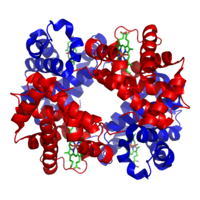
Photo from wikipedia
Manganese deficiency critically impairs the function and stability of photosystem II (PSII) and negatively impacts crop growth and yield. However, the response mechanisms of carbon and nitrogen metabolism to Mn… Click to show full abstract
Manganese deficiency critically impairs the function and stability of photosystem II (PSII) and negatively impacts crop growth and yield. However, the response mechanisms of carbon and nitrogen metabolism to Mn deficiency in different genotypes of maize and the differences in Mn deficiency tolerance are unclear. Herein, three different genotypes of maize seedlings (sensitive genotype: Mo17, tolerant genotype: B73, and B73 × Mo17) were exposed to Mn deficiency treatment for 16 days using liquid culture with different concentrations of MnSO4 [0.00, 2.23, 11.65, and 22.30 mg/L (control)]. We found that complete Mn deficiency significantly reduced maize seedling biomass; negatively affected the photosynthetic and chlorophyll fluorescence parameters; and depressed nitrate reductase, glutamine synthetase, and glutamate synthase activity. This resulted in reduced leaf and root nitrogen uptake, with Mo17 being most severely inhibited. B73 and B73 × Mo17 maintained higher sucrose phosphate synthase and sucrose synthase activities and lower neutral convertase activity compared to Mo17, which resulted in higher accumulation of soluble sugars and sucrose and maintenance of the osmoregulation capacity of leaves, which helped mitigate damage caused by Mn deficiency. The findings revealed the physiological regulation mechanism of carbon and nitrogen metabolism in different genotypes of maize seedlings that resist Mn deficiency stress, providing a theoretical basis for developing high yield and quality.
Journal Title: Plants
Year Published: 2023
Link to full text (if available)
Share on Social Media: Sign Up to like & get
recommendations!